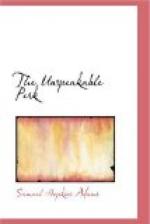“Then I don’t see why they didn’t identify you, anyway.”
“Three years ago I was much heavier, and wore a full beard. Then these glasses, besides being invaluable for protection, are a pretty thorough disguise.”
“So they are. But the game is up now.”
“Yes.” The scientist drew the sheet back over the dead woman. “I suppose the sharp-shooters who did the job will report me safely out of the way. It’s only a question of when the burial party will come for me.”
“Then, why are we waiting?” cried Carroll.
“I couldn’t leave her lying here,” replied the other simply.
The sound of rhythmical labor came back to Carroll’s memory.
“You were digging her grave?”
The other nodded. Carroll, stiffly, for his knifed arm was painful, got out of his coat.
“Where’s an extra spade?” he asked.
When their labor was over, and the leper laid beneath the leveled soil, Carroll cut two branches from a near-by tree, trimmed them, bound them in the form of a cross, and fixed the symbol firmly in the earth at the dead woman’s head.
“That was well thought of,” said the scientist. “I’m afraid that wouldn’t have occurred to me.”
“You can get word to Senor Raimonda?” asked Carroll.
His host nodded. A long silence followed. Carroll broke it:—
“Then there is no further secrecy about this?”
“About what?”
“Her identity.” He pointed to the grave.
“No; I suppose not. Why?”
“Because Miss Brewster has a right to know.”
“Do you propose to tell her?”
“Yes.”
“Very well,” agreed the scientist, after a pause for consideration. “But not until after the yacht is at sea.”
Carroll did not reply directly to this.
“What shall you do?”
“Get out, if I can. I’m ordered to Curacao. Wisner left word for me.”
“Come down the mountain with me.”
“Impossible. There are matters here to be attended to.”
“Then when will you come down?”
“Before you sail. I must be sure that you get off.”
“You’ll come to the yacht, then?”
“No.”
“I think you should. There are reasons why—why—Miss Brewster—”
“It isn’t a question that I can argue,” the other cut him off. “I can’t do it.” There was so much pain in his voice that Carroll forbore to press him. “But I’ll ask you to take a note.”
Carroll nodded, and his host, disappearing within the quinta, returned almost at once with an envelope on which the address was written in pencil. The Southerner took it and rose from the porch, where he had flung himself to rest.
“Perkins,” he said, with some effort, “I’ve thought and said some hard things about you.”
“Naturally enough,” murmured the other.
“Do you want me to apologize?”




